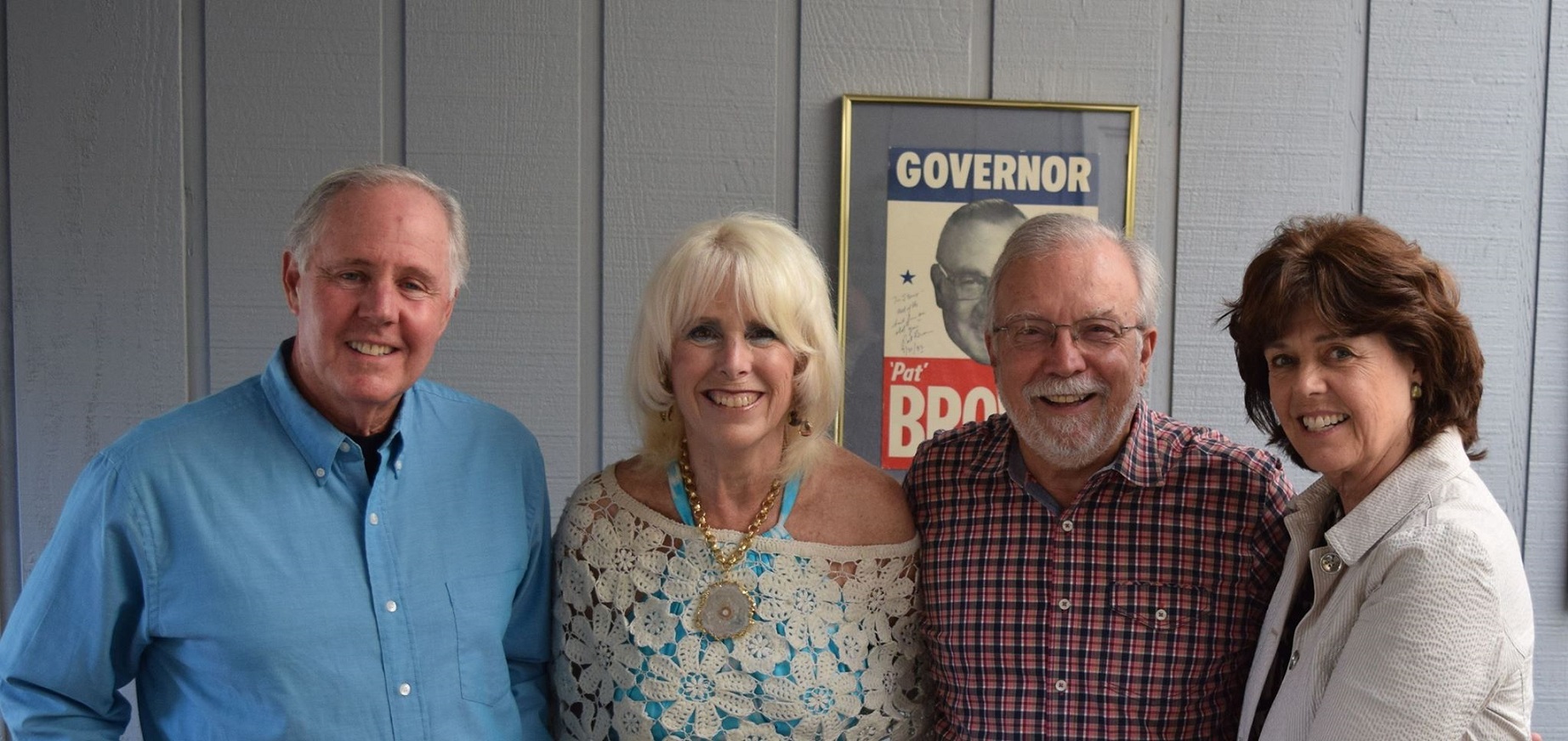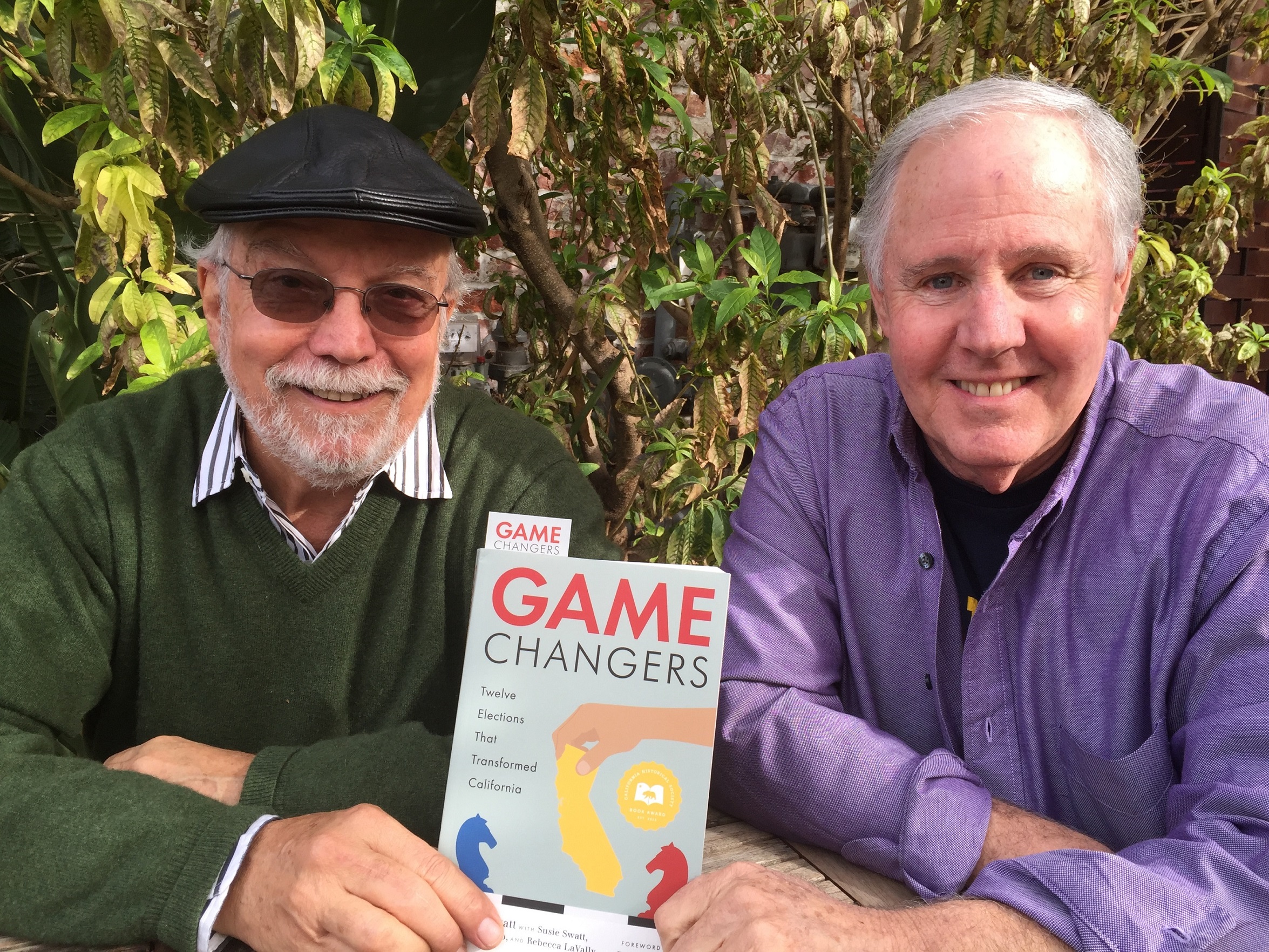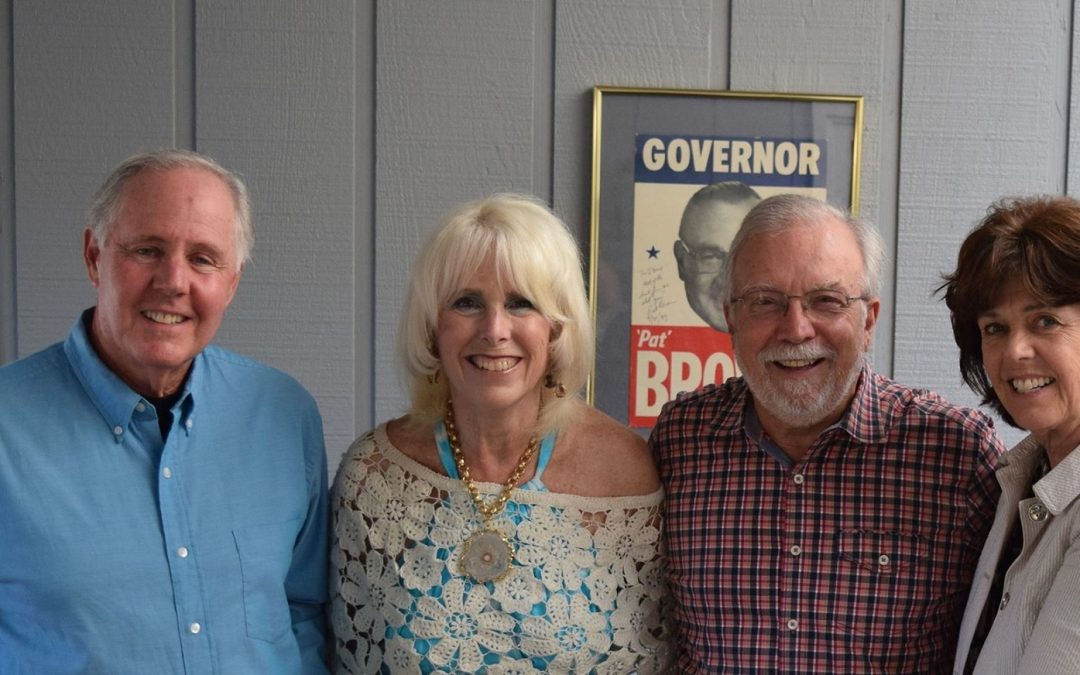Let me start with this paragraph… “I’ve seen many miracles. I’ve seen four babies born. I’ve seen innumerable sunsets. I’ve watched dead languages come alive. I’ve lived to see a black man elected president. These pale into insignificance at the miracle before me: you have managed to make state politics interesting. I’m stunned.” This came from Malcom Margolin, the publisher at Heyday Books in regard to “Game Changers: Twelve Elections that Changed California.” After reading it, I could not agree with anything more. In my view, Game Changers will interest far more than just the usual political junkies that support public affairs books, and should maybe even be required reading for the masses. I sat down recently with two of its four authors – Steve Swatt and Jeff Raimundo – to talk about the book, politics and journalism.

Steve, Susie, Jeff and Becky
RE: Some of us find it difficult to work with a single other writer. All four of you – you two plus your wives, Susie Swatt and Becky LaVally – were working on this project simultaneously. How did you manage to work together in harmony and coalesce all of this information into just the 12 elections that you settled on?
Swatt: That actually wasn’t too difficult, because we would just sit around the table and discuss it. There wasn’t a lot of dispute.
Raimundo: There were no shrinking violets in the group but none of us had an ego so big that it stood in the way of accepting the input.
Swatt: I think after some discussion and a little persuasion here and there, most of the pivotal elections became obvious to us. Hiram Johnson, for example. Pat Brown. Earl Warren was originally not on our list but we came to believe he needed to be. Suzie spent a lot of her time at the capitol on campaign finance issues and she felt very strongly that we needed a chapter where we could talk about the influence of money on politics. So we chose 1980, which was the Assembly Speakership fight which sort of began the ‘arms race.’ But also leading up to that was targeted mail techniques, new campaign techniques that became more expensive. So there were things we wanted to talk about that we felt were very important and we had to find the right vehicle.
RE: I loved the chapter about Upton Sinclair and the 1934 election because there’s no way you could read what happened there and not see the correlation to how campaigns are run today.
Swatt: We started researching and writing in 2014. Californians were staying away from the polls in droves, setting records for low voter turnout. So one of the things we felt very strongly about was trying to convince Californians that votes do count and elections have consequences. So for every election we chose we made the point of connecting the dots between that election and the political environment that led to that election, and how it affected Californians and political institutions years later, even generations later. That’s what’s so stark in that 1934 election. It created political consultants and was the forerunner of negative, nasty television ads.
RE: One of the more surprising things for me was the tremendous role of the mainstream media in shaping California water policy in the early 1900s, that same policy we’re fighting over in 2016.
Swatt: Water will always be a fight in California. In 1905, the Los Angeles Times, for example, was relentless in its over-the-top cheerleading for the city’s appropriation of Owens Valley water. The Times even colluded with LA water czar William Mulholland to publicize a make-believe water shortage prior to a bond election to finance the purchase of land and water rights from Owens Valley farmers and ranchers. Even further, Times publisher Harrison Gray Otis had insider knowledge that the southern terminus of the future Los Angeles Aqueduct would be in the San Fernando Valley. Otis quietly put together a syndicate of wealthy LA businessmen who bought thousands of acres of nearly worthless land in the desolate San Fernando Valley. Once voters approved the bonds, they started selling lots and realized enormous profits.
RE: Great use of that by the way, the newspaper reports. That’s not the easiest thing to do, to pull out just the right thing in the right context.
Raimundo: We wanted stuff that nobody had read about before. One of the examples of what Steve is talking about is, the State Archives has the Earl Warren history in volumes. I came across a letter from a Japanese citizen in the United States who sent a letter to his campaign that talked about how wonderful Earl Warren is, that he’s certainly not like those other people who are against the Japanese. This is of course before he argued for their internment. So it’s like, bingo. That’s the kind of digging you had to do.
Swatt: I was at the Bancroft Library and I remember going through Leland Stanford’s letters. There was a letter there to his mother he wrote while he was governor and president of the railroad and swindling the US government. He says to his mother, ‘my business prospects are looking good.’
RE: You guys did a great job of each chapter stand alone with great storytelling. What was your thought process when you’re working on this?
Raimundo: Very early on we asked ourselves ‘how do we put this together in a way that is easy to digest?’ So we came up with the template early on, and it actually made it easier to write. We knew each chapter couldn’t go beyond 20 to 25 pages.
Swatt: Every chapter starts with an interesting story that we hoped very few people were aware of. Then we go to the backstory of how we got there, which is maybe starting 10 or 20 or 30 years earlier. Then we go to the election itself, how that was waged and fought. And then the impact, and how that affected California, years later, generations later, a century later. That was our formula for every chapter, and it enabled us to again connect the dots so that people can understand how the political environment led to this election which led to these impacts that we are still feeling now. For example, we’re still feeling the impact of what started in 1861with Leland Stanford and him getting federal money for the railroad and then the railroad’s dominance, which led to Hiram Johnson and the initiative process, which we’re still living with today.

Jeff Raimundo and Steve Swatt
Me: Political books often focus on events and things, not people. You have great information but are also really focused on people. In all of this research about characters, who stands out? Were there some who stood out more than others?
Raimundo: For me it was Clem Whitaker and Leone Baxter, the campaign consultants, the pioneers of professional campaign consulting. I knew the names but when we got into it we learned who they really were, how they acted and how much impact they had on politics from 1934 all the way into the early 60s. That was just very fascinating to me. Another one was Dennis Kearney, the 19th Century labor leader in San Francisco. Talk about a sociopath. We talk now about Donald Trump and his anti-Islam rhetoric. For Kearney it was ‘the Chinese must go.’ That’s a template for what Trump’s doing now.
Swatt: For me it was embellishment. For example, I watched [Assembly Speaker] Jesse Unruh as a reporter but there were some things that I wasn’t as aware of, like his MO of basically threatening other legislators with killing their bills if they didn’t come around to his point of view. His Chief of Staff Larry Margolis talked about Unruh’s signature accomplishment – Proposition 1A in 1966, which created the full time legislature – and how lobbyists were holding it up in the Senate. They didn’t like it so they were trying to prevent it from going to the voters. Jesse Unruh calls them over to the El Mirador Hotel across the street from the Capitol and says, in essence, ‘I know you can kill this bill if you want to, but I’m telling you that this is very important to me, so remember that if you want legislation to come out of the Capitol, it’s got to go through my house, and I’ll remember what you do.’ It wasn’t even arm twisting, it was a direct threat.
Raimundo: And this is at the tail end of a time when actually the legislature was controlled by the lobbyists. The Artie Samish’s of the world.
Swatt: I was going to bring up Artie Samish. In editing, there was thought that maybe we had too much on Artie Samish. To me, he is one of those absolutely fascinating characters that makes California what it is. Artie Samish was the single most powerful lobbyist of the 30s and 40s. He boasted that he controlled the legislature. And in fact, Governor Warren admitted publicly that in matters affecting his clients, he has more power than the governor. So some of the Artie Samish stories are amazing.
RE: I’ve seen the picture of him holding a puppet meant to represent lawmakers.
Swatt: Mr. Legislature. My favorite stories from the book, some of them are Artie Samish. He lobbied for liquor, race tracks, transportation, all the big ones. One of his clients was Schenley Industries. They had a bourbon that was getting creamed in the marketplace in California by Hiram Walker’s High Ten bourbon, and so they went to Artie. Samish does some research and finds out that High Ten bourbon is aged three years, so he has a bill pushed through the Legislature that requires bourbon sold in California had to be aged for four years. Governor Warren vetoed it but the Legislature overrode the veto, and it puts Walker out of business. That is raw power.
Raimundo: The puppet story was good too. He was interviewed by Collier’s Magazine, and in the interview his ego got in the way of his common sense and he talked about how the legislature was his puppet.
Swatt: Samish had a client who was having problems with an Assemblyman who represented downtown Los Angeles, including Skid Row, 1934. His name was Clare Woolwine, a Republican. They went to Artie and said, ‘can you scare him a little bit?’ So Artie sends his top aide to the ‘Upton Sinclair for Governor’ headquarters in downtown LA where they had a lot of folks from Skid Row stuffing envelopes. The aide says, ‘anybody here from the 41st district?’ This guy, John Pelletier, raises his hand. He turns out he has no job and is on $12 a month relief. They grab him, cleaned him up, bought him two $25 suits and ran him for the Assembly. They sent out 100,000 postcards with his picture in front of the Capitol. He won and then was re-elected five times. That’s Artie Samish.
RE: Is it discouraging to you that there is so little knowledge about the forces at play in our political process?
Swatt: It’s very discouraging, and that’s one of the reasons we decided to write this book. People tell pollsters they dislike politicians, they’re disillusioned with government and that they’re vote doesn’t count. Having watched politics and government for so many years, all of us know that votes do count, they do make a difference and elections have consequences. That was the primary driving force for this book.
Raimundo: And by showing that this happened over such a long course of time, it also demonstrates to people that it is unchanging. It is the way political life is. So what you think today is so outrageous has been handed down from more than a century ago.
Swatt: The venue has changed, the technology has changed, but it’s still there.
Raimundo: The conduct is the same. Taking voters for granted is still the same. One of the things that came through in the chapter on the 1879 state constitution was hearing exactly the same complaints that we’re hearing today. High taxes are driving businesses out of state. The haves have all the water and the have-nots don’t. Corruption in politics. Go down the line, it’s all the same arguments you hear today.
RE: I’m both fascinated and repulsed by what we’ve seen in this presidential campaign so far. One of the most fascinating things about this book is that you are seeing the same kinds of things now.
Swatt: You could ask anybody today and they would say that today’s campaigns are the dirtiest ever. And then you go back to 1934. How can you compare what we see today with having a movie studio creating phony newsreels with professional actors that completely fabricate issues and points of view?
Raimundo: And in that same election the largest newspaper in the state literally taking on as its purpose in its news stories the goal of defeating that candidate.
Swatt: And bragging about it! We got one quote from [former LA Times editor] Kyle Palmer where he says, ‘”We don’t go in for that kind of crap that you have back in New York–of being obliged to print both sides. We’re going to beat this son of a bitch Sinclair any way we can. . . . We’re going to kill him.” That was the Los Angeles Times back then.
Raimundo: They were the Fox News of the day. Even worse than Fox.
RE: We forget that impartiality is a fairly new phenomenon.
Raimundo: It’s basically from the 40s.
Swatt: The Los Angeles Times did not change until Otis Chandler became the publisher. That was 1960. Up until then it was a very conservative.
Game Changers: Twelve Elections that Transformed California can be purchased at Barnes & Noble, independent bookstores and on Amazon.

